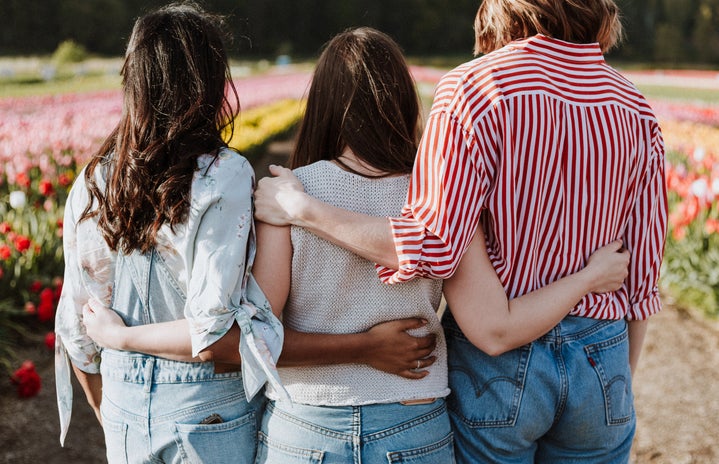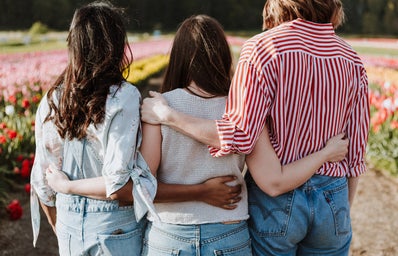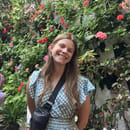Now that I’ve been studying abroad for two months I feel like I’ve finally adjusted to how my life flows. Taking the leap to study abroad was one of the most independent things I’ve ever done. Through this process, I’ve learned a lot about life in Europe and about myself. I knew that some of the tricky things about studying abroad would include figuring out where things are in a new city, working around the language barrier, adjusting to new meal times and getting used to living with a host family. And while these changes have been challenging, I’ve figured each of them out. What has taught me the most, however, is all the things I never expected.
I’m a huge planner. I make packing lists for weekend trips, spreadsheets for my budget and notes app checklists for all the things I want to experience when I travel. As I result, I planned a lot before leaving for study abroad: I made meticulous lists, asked everyone I knew who had studied abroad about what to bring and thought through what I would do in case things went wrong during my first few days abroad. I even made sure to get to Spain a little early so that I wouldn’t be that jet-lagged when I met my host mom and friends and started orientation. It was scary at first, but I had it planned out enough that, as I ate my first meal alone at a taco place not far from my hotel, I felt excited and confidently independent. I had expected to be seen as an imposter and to be stared at, so the complete lack of attention I received was refreshing.
I think part of my desire to be so independent comes from the ideal image I have created in my head of the strong, independent woman who can do anything on her own. Our culture puts such an emphasis on pulling yourself up by your bootstraps, not needing anyone else’s help and the idea that you can do anything for yourself. As a woman, there is an even bigger emphasis on being self-reliant to be strong. The phrase “strong independent woman” cemented itself in my brain. The ideal “travel girly” I saw on TikTok seemed so effortless and powerful, so I wanted to embrace that as fully as I could.
However, the last thing I could have planned for happened, ending any and all hopes of being independent: I got food poisoning. And the cherry on top was that the only possible culprit was the very same taco place where I had my first meal alone. My very act of trying to assert my independence was the one that forced me to need the help of others.
I began to feel isolated as my illness set in. What’s worse, I didn’t know how to deal with my pain. While my friends wanted to take on the city, try new foods, walk around and shop, I struggled on, doubled over, frequently taking moments to sit down and had virtually no appetite. I didn’t want to miss out on any new adventures, but I also didn’t have the heart to ask my friends to slow down for me. So I suffered in silence.
Until my host mom saw my tear-stained face at dinner. The truth came spilling out of me and she jumped into action, making me manzanilla tea and prescribing me the diet I needed to start feeling better. Her assertive care was exactly what I needed and I quickly started feeling physically better.
Despite starting to improve physically I was still feeling isolated from my friends. I felt like they didn’t see the pain that I was going through and weren’t being sympathetic. So I pulled my go-to move—called my mom—and she explained to me that really, my façade of independence was masking my pain, making it seem like I was doing better than I was. I needed to communicate my need for their help and let myself be vulnerable, even if that meant I wasn’t the entirely independent person that I wanted to be. I learned that oftentimes, needing help doesn’t make you weaker.
Once I allowed myself to admit that I was struggling and needed help, I found that this help was everywhere, as long as you were open to it. This was reinforced when I needed to get a prescription filled.
I knew that medical care would be very different in Spain, so I felt completely out of my depth. Upon arriving in Madrid, I was surprised to see the green light-up plus signs that signal “farmacias” everywhere. In fact, when I step onto the street outside of my host house, I can see three of these stores. So even though I knew that it would be easy to find a pharmacy, I was still concerned that I wouldn’t be able to communicate my needs.
When I went to pick up a prescription, I was disheartened to find out that the brand of medication I use isn’t available here. Once the pharmacist apologetically explained this to me, I started to panic, which only worsened my already mediocre conversational Spanish. I started to spiral, thinking about all the hurdles I’d probably have to jump through to contact my doctor back home and figure out a replacement solution.
Disheartened, I thanked the pharmacist and started to leave, thinking there was nothing else she could do for me. However, she stopped me and suggested I leave my phone number for her to call if she found a replacement. I left my number, thinking to myself “She’s never gonna call me, so why bother going to the extra effort?” But, sure enough, only thirty minutes later, she called me to explain that she had found exactly what I needed. She left the name of the medication and I marched with a new confidence to the next pharmacy.
However, at this pharmacy, despite recognizing the name of what I needed, they did not have it stocked. Finally, a few hours later, I entered a third, very crowded, small pharmacy. I anxiously waited only to find that I had misspelled the name of the medication from earlier and this pharmacist showed no recognition of what I was trying to say. However, a woman next to me saw me struggling and jumped in, spelling what I had written out and pronouncing it in Spanish. Sure enough, my medication was found and I was good to go. The relief that poured over me was immense. I had no idea how much this wild goose chase had been stressing me out.
Where in the U.S. I would be disheartened and out of luck almost at the first impasse, in Madrid many strangers jumped in to help, urging me on with their kindness. Even though I knew that the system was different here, I had put my American expectations on my experience and almost gave up. Thankfully though, as long as I kept going and accepted the help of everyone around me I found that help was just around the corner, urging me on with a green positive sign.
I learned that as long as you are open to it, help is all around, even from strangers. Often you can only get to where you need to be by accepting help. Allowing myself to be a bit more dependent and trusting that someone will be there to help me out has been scary, but it has changed my perspective. While being independent is valuable, going through life completely alone just leaves you lost and confused. I learned that accepting help from others does not make me any less independent, it just makes me stronger. So I’d encourage you to do the same: rely on the people around you, regardless of how scary that can be, you will find that you are never as alone as you think you are.


